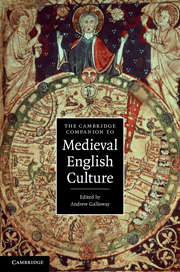Book contents
- Frontmatter
- Introduction
- Part one Theaters of culture: political, legal, material
- 1 From court to nation
- 2 The legal revolution and the discourse of dispute in the twelfth century
- 3 Archaeology and post-Conquest England
- Part two Cultural ideals and cultural conflicts
- Part Three Literacies, languages, and literatures
- Part four Legacies and re-creations
- Guides to further reading
- Index
2 - The legal revolution and the discourse of dispute in the twelfth century
from Part one - Theaters of culture: political, legal, material
Published online by Cambridge University Press: 28 July 2011
- Frontmatter
- Introduction
- Part one Theaters of culture: political, legal, material
- 1 From court to nation
- 2 The legal revolution and the discourse of dispute in the twelfth century
- 3 Archaeology and post-Conquest England
- Part two Cultural ideals and cultural conflicts
- Part Three Literacies, languages, and literatures
- Part four Legacies and re-creations
- Guides to further reading
- Index
Summary
European attitudes toward secular law and dispute regulation in general were transformed through a veritable legal revolution starting in the eleventh century, but with its main thrust coming only after about 1150. How cases were argued and processed before this date established the place and character of law within the political culture of the West with some permanence. A lawyer-dominated world came into being. The timing and manner of the professional's advent on the scene transformed the character of significant sectors in medieval life.
Law and dispute deserve a more prominent place in medieval culture than they usually receive, especially during the “long” twelfth and thirteenth centuries. Conflict always reaches into life's core, which makes the discourse with which we try to handle it culturally central too. Beyond this, the Francophone world rethought its law just when its most enterprising writers were rethinking fiction to create the romance. The two seminal transformations shared many stimuli and influences. Both homed in on psychology, intention, and motivation, privileging questions about how people act. We see in each a similar puzzlement concerning how we know what we think we know, and how in God's name to be sure. Faced by the twin challenges of proof and truth, both romancers and lawyers felt the lure of the miraculous to sort out the hard cases, magic potions, fairies, ordeals, and God's judgment.
- Type
- Chapter
- Information
- The Cambridge Companion to Medieval English Culture , pp. 43 - 65Publisher: Cambridge University PressPrint publication year: 2011
- 1
- Cited by



